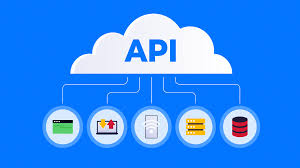Understanding Application Programming Interfaces (API)
 Gift Ayodele
Gift Ayodele
You've probably heard the term API thrown around a lot, especially if you're involved with technology or software development. But what exactly are APIs, and why do they matter so much? In this post, we’ll break down what APIs are, how they work, and why they’re essential for both developers and users alike.
What is an API?
At its core, an API (Application Programming Interface) is a set of rules and protocols that allow one software program to interact with another. Think of it as a bridge that enables different applications, services, or platforms to communicate with each other.
For example, when you use a weather app on your phone, the app communicates with a weather service via an API to get the latest weather data. This is just one of many real-world examples of how APIs are used every day.
How Do APIs Work?
APIs allow software systems to "talk" to each other by sending requests and receiving responses. The process works as follows:
Client Makes a Request:
A user interacts with an app, like requesting weather data or logging into a social media account.API Call is Made:
The app makes a request to the API, asking for specific information or functionality (e.g., "Give me the current weather in Lagos").Server Responds:
The server that holds the requested data processes the request and sends back a response via the API.Data is Displayed:
The app then processes the data received and displays it in a user-friendly format.
Types of APIs
APIs come in different forms depending on how they are structured and the purpose they serve:
Open APIs (Public APIs):
These are publicly available APIs that allow developers to access the functionality or data of third-party services. Examples include the Twitter API or Google Maps API.Internal APIs (Private APIs):
These are designed to be used within an organization, allowing various internal systems to interact with each other. They are not accessible to external users.Partner APIs:
These APIs are available to specific business partners or clients and are often used to enhance business relationships by sharing specific functionality or data.Composite APIs:
These combine multiple API calls into a single request. For example, a mobile banking app may use a composite API to request account balance, transaction history, and personal details all at once.
Why Are APIs Important?
APIs have revolutionized the way software is built and used. Here’s why they’re so essential:
Efficiency:
APIs allow developers to build on top of existing services rather than starting from scratch. This saves time and effort.Interoperability:
APIs allow different systems and platforms to communicate, which means you can integrate various tools and services seamlessly.Automation:
APIs enable automation by allowing apps and systems to perform tasks without human intervention. This is especially useful in business processes and workflows.Scalability:
With APIs, you can easily extend the functionality of an app by integrating third-party services like payment gateways or cloud storage.Innovation:
APIs promote innovation by allowing developers to create new applications or enhance existing ones using external services.
Real-Life Examples of API Usage
Social Media Login:
Ever noticed how you can log in to various websites using your Facebook or Google account? That’s an API at work. It allows websites to verify your identity through a secure connection with the social media platform.Payment Gateways:
When you purchase something online, APIs enable payment gateways like PayPal or Stripe to securely process your transaction.Travel and Booking Platforms:
Travel sites use APIs to pull flight or hotel data from multiple sources, providing users with real-time information and options.
Conclusion: The Power of APIs
APIs are the unsung heroes behind much of the technology we use today. They power everything from social media platforms and mobile apps to payment systems and cloud storage. Understanding how they work not only helps developers build better software but also gives everyday users insight into the technology that powers their favorite apps.
APIs are the connectors in the digital age, making communication between systems fast, efficient, and reliable. Whether you’re a developer or just a curious user, recognizing the importance of APIs can help you better understand how technology shapes the world around us.
Reference Links:
Subscribe to my newsletter
Read articles from Gift Ayodele directly inside your inbox. Subscribe to the newsletter, and don't miss out.
Written by
